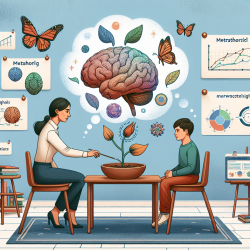Introduction
In the realm of speech-language pathology, creating positive outcomes for children involves not just addressing their speech and language needs but also considering their overall well-being. The study titled Happy Family Kitchen II: A Cluster Randomized Controlled Trial of a Community-Based Positive Psychology Family Intervention for Subjective Happiness and Health-Related Quality of Life in Hong Kong offers valuable insights into how positive psychology interventions can enhance subjective happiness and quality of life, providing a potential framework for improving child outcomes.
Understanding the Study
The Happy Family Kitchen II (HFK II) study was conducted in Hong Kong and involved 2070 participants from various social service units and schools. The study aimed to assess the effectiveness of a community-based positive psychology family intervention on subjective happiness and health-related quality of life. Participants were divided into intervention and control groups, with the intervention group engaging in activities focused on positive psychology themes such as joy, gratitude, flow, savoring, and listening.
Key Findings
The study found that the intervention was more effective than the control condition in improving subjective happiness at 12 weeks post-intervention, although the effect size was small (Cohen’s d = .16). However, there were no significant improvements in mental and physical quality of life compared to the control group. These findings suggest that while positive psychology interventions can enhance subjective happiness, their impact on health-related quality of life may be limited.
Implications for Practitioners
For practitioners in speech-language pathology, these findings underscore the potential of integrating positive psychology principles into therapeutic practices. Here are some actionable steps to consider:
- Incorporate Positive Themes: Use themes like joy and gratitude in therapy sessions to foster a positive environment. Encourage children to express gratitude and engage in activities that bring joy.
- Family Involvement: Engage family members in the therapeutic process. Family-based activities can enhance communication and support, contributing to better outcomes for children.
- Focus on Subjective Well-being: While addressing speech and language goals, also focus on enhancing the child’s subjective well-being. This holistic approach can lead to more comprehensive improvements.
Encouraging Further Research
While the HFK II study provides valuable insights, it also highlights the need for further research. Practitioners are encouraged to explore the following areas:
- Long-term Effects: Investigate the long-term impact of positive psychology interventions on children's speech and language development.
- Tailored Interventions: Develop interventions tailored to individual needs, considering factors such as cultural background and family dynamics.
- Broader Outcomes: Examine the effects of positive psychology interventions on other aspects of child development, such as social skills and emotional regulation.
Conclusion
The Happy Family Kitchen II study provides a compelling case for the integration of positive psychology into therapeutic practices. By focusing on subjective happiness and involving families, practitioners can enhance the overall well-being of children, leading to more effective and holistic outcomes. To read the original research paper, please follow this link: Happy Family Kitchen II: a cluster randomized controlled trial of a community-based positive psychology family intervention for subjective happiness and health-related quality of life in Hong Kong.










